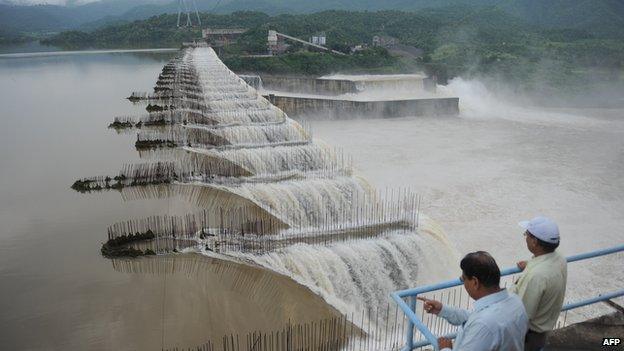Indian media: Narmada dam concerns
- Published

Activists fear thousands will be displaced if the height of the Sardar Sarovar dam is increased.
Media and activists are concerned over the government's plan to increase the height of the Sardar Sarovar dam on the Narmada river in the western state of Gujarat.
Gujarat Chief Minister Anandiben Patel on Thursday announced that the dam's height would be increased from 121 metres to 138.62 metres, papers say.
Work to raise the height of the dam is expected to take 36 to 40 months.
Social activist Medha Patkar, who heads the Narmada Bachao Andolan (Save the Narmada movement) group, has strongly opposed the decision.
"Densely populated villages in Nimad area of [the neighbouring] Madhya Pradesh state, with houses, farms, shops, temples, mosques and standing crops will face a watery grave if the dam's height is increased," the Hindustan Times, external quotes her as saying in a statement.
Greenpeace India has also criticised the announcement, saying it is contrary to the government's promise of inclusive development.
"The government in Gujarat has served a blow to the Narmada Bachao Andolan and all of us who stand in solidarity with the grave impact of the impacted communities and the environment. This seems to be the government's way of making it loud and clear that it's their way or the highway," The Times of India, external quotes Greenpeace's Abhishek Pratap as saying.
However, Water Resources Minister Uma Bharti said the decision to raise the height of the Narmada dam was based on the report of the ministry of social justice and empowerment on the rehabilitation of displaced people, the Zee News, external website reports.
The project, built to resolve power and water shortages in central and western India, has faced controversies in the past as well.
It was initiated by India's first prime minister Jawaharlal Nehru in the 1950s but opposition from campaigners led to long legal battles and delays. The dam finally started generating power in 2007.
Critics say it has displaced tens of thousands of villagers who have not been adequately compensated.
'On time, please'
In other news, four people have been arrested in Delhi for the murder of a retired army officer who fought in the India-Pakistan war of 1971, reports The Pioneer, external.
Major Rohit Sethi, 64, was given the Vir Chakra gallantry award for his "exemplary bravery" during the war.
The army officer was smothered to death after he was given food laced with sedatives, the paper says.
And finally, Urban Development Minister M Venkaiah Naidu was left "upset" after finding our that several officers in his ministry often came late to work, The Asian Age, external reported.
Mr Naidu arrived at 9am [local time] to take a round of the office but was "irked" on seeing many empty chairs and was also unhappy with poor maintenance of the premises, the report added.
BBC Monitoring, external reports and analyses news from TV, radio, web and print media around the world. For more reports from BBC Monitoring, click here. You can follow BBC Monitoring on Twitter, external and Facebook, external.